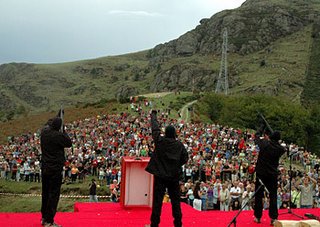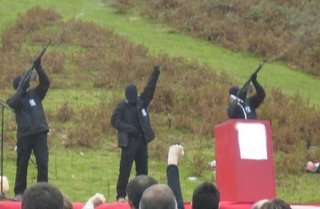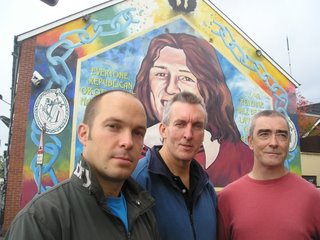"Every measure they have taken is against my will"- "The medical vice-director of the prison told me he would not allow me to be on hunger strike for more than 50 days"
Iñaki de Juana was admitted to Algeciras hospital on Tuesday and he is being intravenously force-fed since Wednesday. GARA is publishing an exclusive interview, dated September 14 in Algeciras jail, when the Donostia-born prisoner had spent 38 days with no food. In the interview, De Juana states that all the measures the medical teams have taken towards him "and the measures yet to come" are against his will.
"I don't think they will take much longer". This was what Iñaki de Juana said last week about the possibility of being force-fed "against my will and by force". In this interview, the prisoner goes over his situation and the situation of the Basque Political Prisoners' Collective, highlighting the idea that there is a Spanish State political strategy being this situation.
- On August 7 you began an indefinite hunger strike. Which were the main reasons that led you to this?
There are four reasons: I am convinced that the jurisprudence created in my case will affect all political prisoners and freedom of speech too, not just me; I am sure that I am not harming anyone and that any positive consequences will be for everyone and negative consequences will only affect me; the need to sat "enough is enough" in the face of so many attacks; and the need to demand my release after having finished serving my sentence two years ago.
- Instead of choosing another form of struggle, you chose the toughest form of protest…
The forms of struggle available to a prisoner are very limited: lock-ups, refusal to do certain things, hunger strikes and some other purely symbolic things. Unfortunately, and despite the fact this is also subject to many limits, the only thing that can be taken seriously as a protest and may serve as a form of pressure is to place your life in the hands of the Administration. And this is also the form of struggle best understood outside, precisely because of its toughness.
- You have had no food for over a month, how has this time passed?
Very quickly, because of the tremendous motivation I have. I feel very strong and positive. Physically, I feel the normal wear, but psychologically I am even more determined than when I made the decision.
- The Audiencia Nacional ordered you to be taken to a hospital for various tests and they also ordered you to be force fed, even against your will. What is your opinion on this?
To date, September 14, they took me out to hospital on the first two weeks, to carry out electrocardiograms and various tests; I refuse to do this voluntarily so as not to cooperate with a medical team made up of the very same people who are prepared to act against my will and using force. After those two weeks, they are carrying out the tests inside the prison, always under the coverage of the Audiencia Nacional decision.
The AN has issued two decisions up to now: one from the Central Penitentiary Court and another one from the First Section of the Penal Court. Both say I can be taken to hospital whenever they want and they can do all kinds of tests.
They have not issued the order to force-feed me yet, but they have said they will and I don't think they will take much longer, because even the medical vice-director of the prison told me he would not allow me to be on hunger strike for more than 50 days without them force-feeding me.
Both the measures they have taken up to now and the ones still to come are unjustly violating my will, regardless of how much constitutional backing they have. It is not only psychological torture, in that it violates my will, but also physical, violating my body, because they do it through physical force. In addition, these measures lengthen your suffering, but they do not guarantee you will live, nor do they guarantee you will have a healthy life in decent conditions.
- One of the court decisions used your medical precedent of "kidney failure" as justification…
In the early 90s, in Salto del Negro jail, there were a number of very tough struggles. During 1992, I took part in three long hunger strikes. Other comrades, Esteban, Tapia, Garratz… did more than I, before and after I was there.
During the third and last hunger strike I took part in, after forty-something days I had a bad case of kidney failure. They forcefully intubated me and urgently got me out of the prison. I must have been in bad condition because there was a doctor with me all the way on the ship and then in the ambulance, all the way to the Málaga Prison Infirmary, where they held me for a month and a half until I recovered.
As you know, when the kidneys stop, the damage is definitive, but mine did not get that bad. The damage was reversible and I recovered completely. Fourteen years later, the Penitentiary Administration has shaken the dust off this old situation and included it in the medical history it has sent to the Audiencia Nacional to justify these hurried measures. That is why the court decision makes that reference.
However, I want to make it clear that at the time of beginning the hunger strike my health was perfect, I had no illnesses whatsoever.
- You have expressed total determination to carry on with the hunger strike, what makes your decision be so firm?
It is the only weapon I have. I do not know what will happen in this situation. It will depend on several factors. But I am certain that the alternative is life imprisonment and dying of old age in prison. I choose to fight, and we will see what happens. In any case, fighting in itself is winning. But I do not want my decision to be seen as a desperate measure; that it is not. It is a struggle.
- Since you began your protest many protests have taken place in the street. What is the value of these gestures of solidarity? Do you feel the warmth from the street?
Yes, it gets in here and I can feel it. These actions are extremely important for my morale and for the possible, though difficult, resolution of this situation. I am immensely grateful. But I am also conscious that only a small part of this is because of me, and so it should be. Solidarity is for all the political prisoners and for all those who suffer reprisals because of their political ideas. Of course, mine is one of the most striking situations, although all of them are a scandal. And at this point in time it seems this has been cathartic in the midst of the sickness about the lack of movement and all the attacks.
- Attacks against the Basque Political prisoners' Collective and their living conditions have come in quick succession; what is your reading of the situation and what is your assessment of the Collective as a whole?
I am not the person to ask about the Collective as a whole. The only ones who can and must answer that are the comrades officially appointed representatives of all the Basque political prisoners. Plus, honestly, it would be unfair for me to answer this because, strange as it may seem, I do not know. I mean that after the policy of dispersal began, I have almost always been held in isolation wings, with very few comrades, so I only know what a few of us think.
Personally, I think that for years, especially the last three years, the State has been filling the bag with hostages; in order to let them go later on, if needs be, little by little. And to draw out any possible resolution process over the years, keeping up the blackmail. To sell the dismantling of the previously taken increases in repression as if this was a gesture of generosity and after a number of years, to arrive at the same situation we were in fifteen years ago.
However, and I am not talking in anyone's name, what I do know, as any observer should, is that the Collective has resisted every kind of attack for almost thirty years, and we will continue to resist.
- In your case, they have used two opinion articles in order to request a new sentence of 96 years in jail…
But the first argument they used not to release me was because they voided definitive judicial decisions about my remission due to studies. When they could no longer use this because it was even causing contradictions among the judges and they still had not come up with the "Parot Doctrine", they came up with the thing about the articles. Anything goes to keep the hostage bag full. Don't let anyone out; or, at least, don't let anyone they don't want out.
- Lately, Basque political and institutional leaders have made statements asking for the prisoners to be repatriated, or, at least, for them to be moved closer to their homes. What is your assessment of these statements?
They are a firework display. Pure hypocrisy. Because these are nothing but statements, the deeds do not match the words. They implement no measures to give credibility to their words. Plus, you must not forget that all those leaders are collaborators in dispersal, the suffering, the deaths, inside prison and also relatives and friends, the road accidents, the economic burden…
The only ones who have always been on the side of the prisoners are the Basque independence movement, and we must not forget this or be distracted with talk and hot air. What is happening is that, with their attitude and lack of dignity, yet again, all those politicians are looking to make political profit from the possible future repatriation of the prisoners.
- Do you have any hope that popular pressure will achieve anything for the Collective?
Personally, I expect nothing but repression from the Spanish leaders. I expect nothing from Basque and false-Navarrese collaborationists. As always, the independence movement will have to face the problems and solve them on its own, with its own strength. As always, through struggle and sacrifice. Struggling and rebelling means not allowing ourselves to be assimilated. It means resistance. And, in the long run, it means victory.







